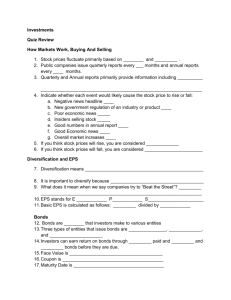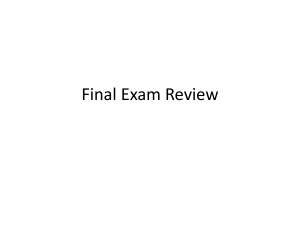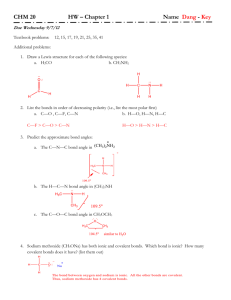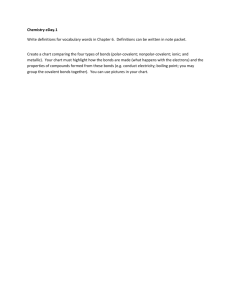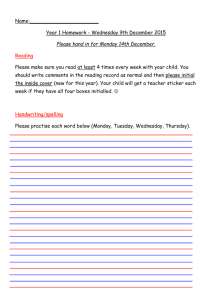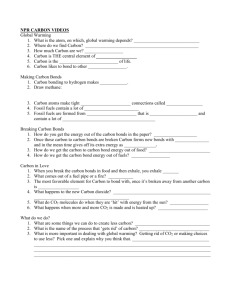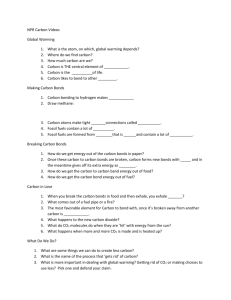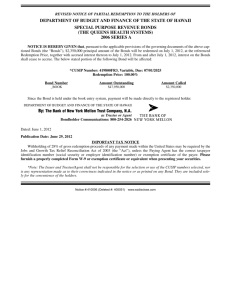Personal Finance Test Review
advertisement
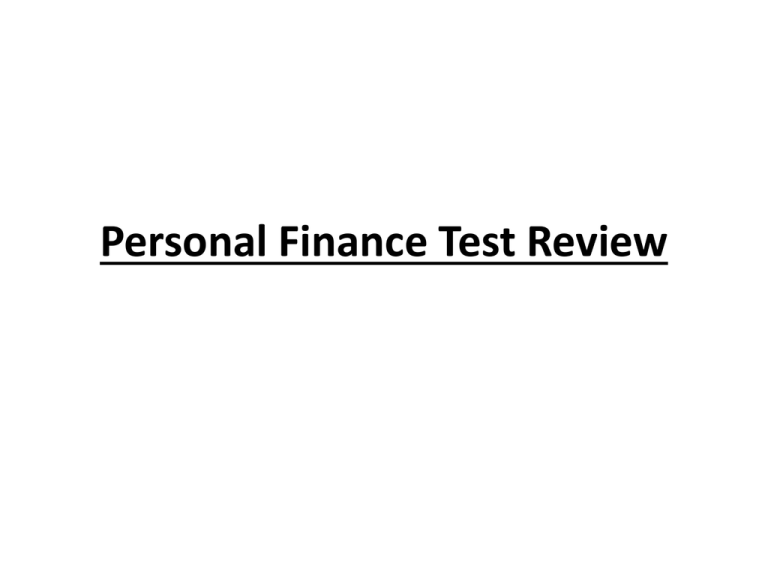
Personal Finance Test Review Post Test Review • A. Credit is the ability to obtain goods/services before payment is made based on the trust that payment will be made in the future • 1. Credit Score is a numerical summary of the information contained in a credit report • a. Credit Scores range from 300 (low) to 850 (high) • b. Your credit score is used in determining credit card interest rates, mortgage rates, loan interest rates, etc. Post Test Review • c. The major factor in your credit score is your payment history (do you pay your bills on time) • d. Credit problems remain on your credit report for 7 years Post Test Review • B. Income money received on a regular basis from work or through investments • 1. Income that is not taxed is called an exclusion • 2. The total amount of taxes that people pay on their income is called a Tax Liability • 3. Adjusted Gross Income (net income) is Gross Income – Tax Deductions= Taxable Income • 4. Exemption a deduction by law to reduce taxable income (eg. Spouse, children, etc.) • 5. Retirement Income paid by a company is called a 401K • 6. The federal tax collected on the value of one’s property at the time of his/her death is called an inheritance tax Types Of Income • 1. Earned Income is income received from salaries, wages, tips (money you earn from working) • 2. Gross Income is income before taxes • 3. Net Income is income after taxes • 4. Discretionary Income is income spent on luxury items, vacations, non essential goods and services (eg. Movies, clothes, concerts, etc.) • 5. Net Worth is the difference between a person’s assets (things of value) and liabilities (debts you owe) (eg. You own a house worth $200,000 and you have bills worth $100,000, your net worth would be $100,000) • a. Net Worth is interchangeable with equity and capital Post Test Review • • • • • Define the following: 1. Bonds 2. Bearer Bonds 3. Registered Bonds 4. Serial Bond Post Test Review • C. Investment Tools • 1. Bonds are debt investments where an investor loans money to an entity (corporation, government, etc.) that borrows the funds for a specified period of time at a fixed rate of interest • a. Bearer Bond is a bond issued by a corporation or government; It is unregistered, meaning there are no records of the owner Post Test Review • b. Registered Bond Are bonds whose owner is registered; The owner’s name and contact information is recorded and kept on file with the company • c. Serial Bonds are bonds that matures in regular intervals Post Test Review • d. Convertible Bond is a type of bond where the holder can convert it into a specified number of shares of common stock • e. The dollar amount that the bondholder will receive when the bond matures is called it’s face value Post Test Review • f. Treasury Bills are short term bonds issued by the U.S. Government that mature in a year or less • 1. They can mature in 4 weeks, 13 weeks, 26 and 52 weeks Post Test Review • 2. Traditional IRA Individual Retirement Account is an investing tool that provides tax advantages for retirement. • a. The contributions to the IRA may be tax deductible depending on one’s income, filing status, etc. • b. The earnings on the IRA are taxed deferred Post Test Review • 3. Mutual Fund an investment vehicle that consists of a pool of funds collected from many investors for the purpose of investing in securities such as stocks, bonds, etc. • a. The primary benefit of a mutual fund is diversification (made up of stocks, bonds, money market accounts, etc.) Post Test Review • A. Savings is a bank account that earns interest • 1. The Time Value of money refers to the concept that money is more valuable today, than, it is in the future because money earns interest • 2. To calculate the time value of your savings you need to know the principal, annual interest rate and the amount of time the money will be in the account • 3. Future Value is the amount your deposit will be worth in the future, at a specified time for a specific interest rate Post Test Review • • • • • • Define the following: 1. Small Business Administration 2. Small Claims Court 3. FDIC 4. Federal Reserve System 5. Private Mortgage Insurance- what is it/who does it protect Post Test review • Personal Finance Test Review.pptx Using the above PowerPoint, create a quizlet for 2 other students to take to help them study for the final. Also use the PowerPoint from the year to assist you in your question making. Email me the results of your quizzes. I will check to make sure that you have taken at least 2 quizzes. Anything extra with high marks could result in some extra credit.


